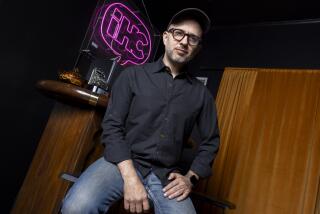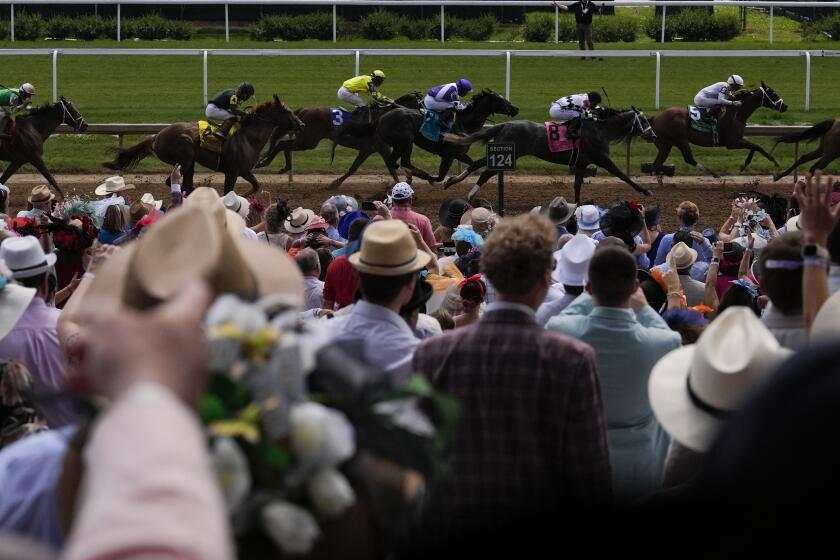An Old Flame Returns : L.A. Quietly Welcomes Torch for Sports Festival
- Share via
Had to be L.A. Had to be.
Here is Michael Corrin, reverently running the Olympic flame up a Santa Monica hill on Thursday--the same hill where O.J. Simpson carried the flame seven years ago on its way to the Coliseum and the 1984 Summer Olympic Games.
And some guy driving downhill in a station wagon thinks traffic is too slow, hangs a U-turn on the hill and nearly takes out Corrin, forcing him and the flame up on the sidewalk.
The Rodney Dangerfield torch relay: no respect.
OK, that’s not exactly true.
Thursday was Day 12 of the Olympic flame’s return to California for the U.S. Olympic Festival. While the historic fire on a stick, from the original mother flame in Greece, did not draw the ticker-tape crowds that hailed its 1984 journey, Corrin had the spirit. He hugged his two-person cheering section--his girlfriend and her mother--and said: “It’s not the quantity of your fans, it’s the quality.”
Down the length of Pacific Coast Highway, along the route that the flame had blazed seven years ago, fans were sparse but ardent.
Compared to the tumultuous PR blowout of 1984, this run, with a lighter-weight torch (three pounds with fuel), had about as much buildup as the Trojan Horse, which may account for the driver’s surprise when he encountered it.
The 1,700-mile relay will escort the flame into Dodger Stadium on July 12 to begin the national amateur sports festival that serves as an Olympic warm-up and a celebration.
“It’s targeting a different crowd,” said Bonnie Daland, the California torch run coordinator. To carry the torch for a kilometer in 1984 cost a $3,000 donation. “This time it’s $40. So we get a different crowd--families, kids.”
Runners wore the T-shirt of the run’s chief sponsor, the U.S. Postal Service. “Real Fast Mail/Real Fast Male” (or Female), the shirt read. One mail carrier, fresh off his rounds, ran in his uniform shorts.
Robbie Burdette was 13 when he carried the torch in 1984. He collected his $3,000 by pitching his cause door to door with his dog. Back then, he handed off to the Lakers’ Jamaal Wilkes.
On Thursday, he handed off to 6-year-old Alexis Ramirez, who needed some help keeping the torch upright to hand it to her 8-year-old brother, Marco. Their father, Samson, was the third athlete: he ran backwards for two-fifths of a mile, videotaping his kids.
As in 1984, the spectators were as entertaining as the spectacle.
Lilianna Kaplan fled to Paris for the 1984 games because of crowds and blocked streets. On Thursday, Vassel Marcial, 30, was practically in front of her house, waiting to carry the torch.
“Be careful with the traffic,” Kaplan said helpfully. When the flame arrived, she squealed, “This is great! You have to go to Greece for that!”
Vacationers Dale and Maureen Berry, who work at Purdue University, had seen Henry Winkler and Arsenio Hall during their visit, and now this.
“It’s pretty exciting,” Dale deadpanned. “I doubt if there’s a chance of us ever seeing the torch pass through Indiana.”
The Wolfberg family were Olympic volunteers in 1984. This time they were the stars.
Anya ran her leg on Monday, in her bridal gown, the day after her wedding. Her white train was bunched up in one hand and the torch was in the other. Her new husband ran at her side in his rented tuxedo.
Other Wolfbergs ran down San Vicente Boulevard at rush hour Thursday, almost indistinguishable from joggers.
“I think people driving were a little bit annoyed,” said David, 22, “but when they realized what was happening they honked.”
Norm Swirin, “excited as hell,” ran from Alice’s Restaurant to the psychic reader on Pacific Coast Highway. He teaches tennis at a clothing-optional camp in Topanga. He did not bother to ask if he could run nude, he said, but “it would’ve been great.”
Corrin said he practiced the night before running up the hill in suit and loafers, one arm aloft. In 1984, he was best man at a wedding, and stepped out of the church just as the torch passed.
“I saw it go by and I said, ‘I should have done that.’ ”
In 1984, there were bullhorns and whistles and cheers and sirens. In 1991, there were car horns and sea gulls and the surf.
“Then, I was nervous,” recalled Burdette. “All those people around, choppers in the sky.
“But it’s not the crowds that make you feel good inside. It’s what you’re carrying, and what it means.”
More to Read
Go beyond the scoreboard
Get the latest on L.A.'s teams in the daily Sports Report newsletter.
You may occasionally receive promotional content from the Los Angeles Times.











